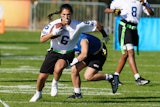The late rapper The Notorious B.I.G. referred to a perception of the options for urban males in the song “Things Done Changed” by saying that “the streets is a short shop. Either you’re slingin’ crack rock, or you got a wicked jump shot.” He was articulating a part of the sense of economic desperation that many people feel when their options for financial prosperity seem to be extremely limited. When “conventional” routes seem to be closed off, a narrow focus on the routes that appear to be more open like athletics can be heightened.
When economic conditions are extreme, one can feel more inclined to go to more extreme measures to survive and prosper. One of these extreme measures can be an elevated level of athletic performance with the hopes that it will be a vehicle to elevate their financial status. The concept of economic desperation is not one that is based only on anecdotal stories. There is a mountain of wealth data that paints a clear picture of the economic state of Black America.
The data is conclusive that the economic conditions of Black people in America are extreme when compared to other groups. A report entitled The Economic State of Black America: What is and What Could Be “ estimated “a $300 billion disparity between Black and white families in the annual flow of new wealth, some 60 percent of which comes from intergenerational transfers. Every year there is a massive intergenerational transfer of family wealth, creating an effect that is both profound and self-perpetuating. Black families are less likely to receive inheritances, and when they do, the amounts are smaller. The gap in inheritances between Black and white recipients is some $200 billion annually.”
In addition, the Harvard Business Review estimates that there is “a $220 billion annual wage disparity with Black workers concentrated in lower-wage jobs, underrepresented in higher-paying occupations, and paid less, on average, than white workers in the same occupational categories, especially in managerial and leadership roles.”
The fragility of the low wage market leaves people living with a sense of desperation. This often entails long stints of unemployment, underemployment, and employment discrimination. This may entice people to go into the underground economy to meet basic needs. There is also a portion of students who come from low socioeconomic backgrounds who grow up with a feeling of inadequacy that can last throughout adulthood. Economic deprivation has the capacity to crush the self-esteem of students, parents, and communities.
An argument can be made that that there is simply more at stake on average for Black athletes because of the economic conditions of Black people in the United States. The stakes are raised and there can be the impression that more is on the line. This enhances the allure of the “athletic lottery” as a “way out” and many young people see sports as their best route to a college scholarship.
The term “athletic lottery” is a reference to the small percentage of athletes who receive college athletic scholarships or professional contracts versus the very large number of people who are vying for them. This usage of the term in this piece is not intended to diminish the dedication and hard work that athletes put toward honing their skills and talent.
Athletic talent is utilized at young ages as a ticket to private schools that are located both in their home city and in other parts of the country. This increases the incentive for children and parents to place an even greater emphasis on the development of athletic talent based on the possibility that it will create opportunities to attend better-resourced schools that can provide a higher level of academic instruction and athletic exposure.
 Dr. Marcus Bright
Dr. Marcus BrightSymbols of athletic transcendence also play a key role in providing examples of how winning the athletic lottery can provide economic deliverance from a prior condition of economic desperation. This plays out in cities all over the country where certain players inspire a generation of younger players to follow their journey. The symbolic power of these examples is even more potent when a native of their neighborhood makes it into the professional ranks. This is the ever-present dream that dominates the mind of urban athletes. Examples of players who had this kind of impact on their home areas are Isiah Thomas in Chicago, Anfernee “Penny” Hardaway in Memphis, and Dwayne “Pearl” Washington in New York City.
These examples of athletic lottery winners create narratives that people can identify with and apply to their own lives. Widespread buy-in eventually leads to a greater level of embeddedness and adoption for large populations of people. This greatly influences how both individuals and broader communities think and behave. Elements that create mass participation in the athletic lottery eventually become a taken for granted aspect of life that is considered common and “par for the course.”
The growth and proliferation of the athletic lottery is based on many people buying into the belief that they too can win despite there being significant odds against it. Many young people have the illusion of there being a much greater likelihood that they will reach the professional ranks than they actually have. The odds of getting there are slim to none regardless of one’s desire to get there.
The few athletes who emerge and gain access to the upper levels of college and professional athletics are treated much differently from the majority of Black people in the United States. Black males, in particular, receive a celebration and adoration in the athletic arena that they find in no other area of society. The economic desperation that is prevalent in a large number of communities creates a sense of urgency in many student-athletes where they feel that their lives will be cut short or will be lackluster if they don’t escape the environment where they were raised.
The economic status of Black America is one of the multi-faceted elements of the athletic lottery that contains more than what may initially meet the eye or be at the forefront of one’s mind. It is important to unpack the placement and potency of athletics in predominately Black communities and explore the various dimensions of this phenomenon. The more we can study this area that has consistently produced greatness against considerable odds, the more we can potentially institutionalize this excellence into other areas.
Dr. Marcus Bright is a scholar and educational administrator.
















